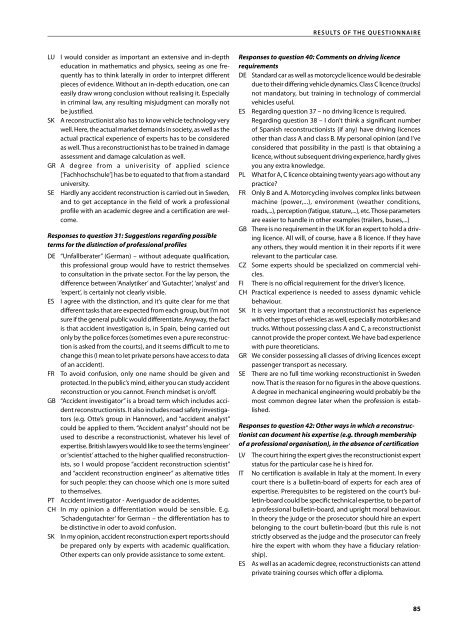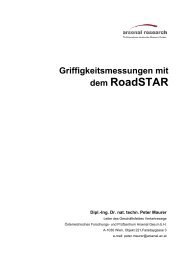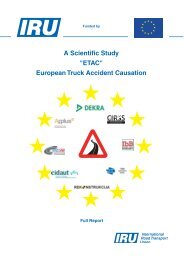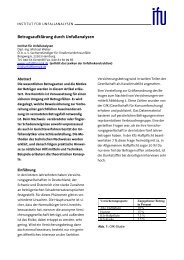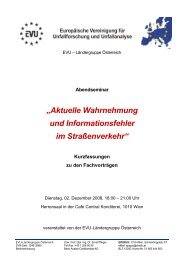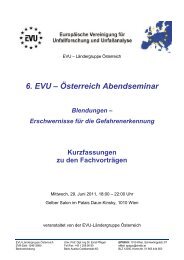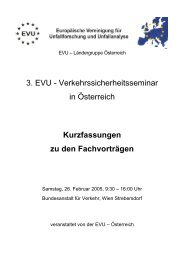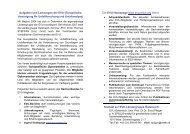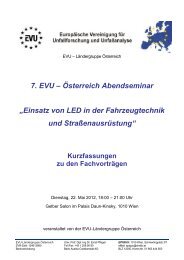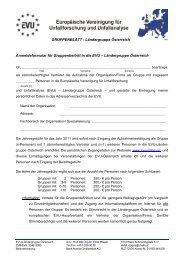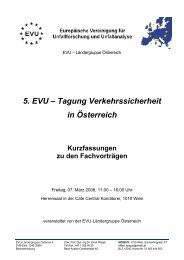THE QUERY PROJECT - European Commission - Europa
THE QUERY PROJECT - European Commission - Europa
THE QUERY PROJECT - European Commission - Europa
Create successful ePaper yourself
Turn your PDF publications into a flip-book with our unique Google optimized e-Paper software.
LU I would consider as important an extensive and in-depth<br />
education in mathematics and physics, seeing as one frequently<br />
has to think laterally in order to interpret different<br />
pieces of evidence. Without an in-depth education, one can<br />
easily draw wrong conclusion without realising it. Especially<br />
in criminal law, any resulting misjudgment can morally not<br />
be justified.<br />
SK A reconstructionist also has to know vehicle technology very<br />
well. Here, the actual market demands in society, as well as the<br />
actual practical experience of experts has to be considered<br />
as well. Thus a reconstructionist has to be trained in damage<br />
assessment and damage calculation as well.<br />
GR A degree from a univerisity of applied science<br />
[‘Fachhochschule’] has be to equated to that from a standard<br />
university.<br />
SE Hardly any accident reconstruction is carried out in Sweden,<br />
and to get acceptance in the field of work a professional<br />
profile with an academic degree and a certification are welcome.<br />
Responses to question 31: Suggestions regarding possible<br />
terms for the distinction of professional profiles<br />
DE “Unfallberater” (German) – without adequate qualification,<br />
this professional group would have to restrict themselves<br />
to consultation in the private sector. For the lay person, the<br />
difference between ‘Analytiker’ and ‘Gutachter’, ‘analyst’ and<br />
‘expert’, is certainly not clearly visible.<br />
ES I agree with the distinction, and it’s quite clear for me that<br />
different tasks that are expected from each group, but I’m not<br />
sure if the general public would differentiate. Anyway, the fact<br />
is that accident investigation is, in Spain, being carried out<br />
only by the police forces (sometimes even a pure reconstruction<br />
is asked from the courts), and it seems difficult to me to<br />
change this (I mean to let private persons have access to data<br />
of an accident).<br />
FR To avoid confusion, only one name should be given and<br />
protected. In the public’s mind, either you can study accident<br />
reconstruction or you cannot. French mindset is on/off.<br />
GB “Accident investigator” is a broad term which includes accident<br />
reconstructionists. It also includes road safety investigators<br />
(e.g. Otte’s group in Hannover), and “accident analyst”<br />
could be applied to them. “Accident analyst” should not be<br />
used to describe a reconstructionist, whatever his level of<br />
expertise. British lawyers would like to see the terms ‘engineer’<br />
or ‘scientist’ attached to the higher qualified reconstructionists,<br />
so I would propose “accident reconstruction scientist”<br />
and “accident reconstruction engineer” as alternative titles<br />
for such people: they can choose which one is more suited<br />
to themselves.<br />
PT Accident investigator - Averiguador de acidentes.<br />
CH In my opinion a differentiation would be sensible. E.g.<br />
‘Schadengutachter’ for German – the differentiation has to<br />
be distinctive in oder to avoid confusion.<br />
SK In my opinion, accident reconstruction expert reports should<br />
be prepared only by experts with academic qualification.<br />
Other experts can only provide assistance to some extent.<br />
R E S u lt S o f t h E Q u E S t I o n n A I R E<br />
Responses to question 40: Comments on driving licence<br />
requirements<br />
DE Standard car as well as motorcycle licence would be desirable<br />
due to their differing vehicle dynamics. Class C licence (trucks)<br />
not mandatory, but training in technology of commercial<br />
vehicles useful.<br />
ES Regarding question 37 – no driving licence is required.<br />
Regarding question 38 – I don’t think a significant number<br />
of Spanish reconstructionists (if any) have driving licences<br />
other than class A and class B. My personal opinion (and I’ve<br />
considered that possibility in the past) is that obtaining a<br />
licence, without subsequent driving experience, hardly gives<br />
you any extra knowledge.<br />
PL What for A, C licence obtaining twenty years ago without any<br />
practice?<br />
FR Only B and A. Motorcycling involves complex links between<br />
machine (power,...), environment (weather conditions,<br />
roads,...), perception (fatigue, stature,...), etc. Those parameters<br />
are easier to handle in other examples (trailers, buses,...)<br />
GB There is no requirement in the UK for an expert to hold a driving<br />
licence. All will, of course, have a B licence. If they have<br />
any others, they would mention it in their reports if it were<br />
relevant to the particular case.<br />
CZ Some experts should be specialized on commercial vehicles.<br />
FI There is no official requirement for the driver’s licence.<br />
CH Practical experience is needed to assess dynamic vehicle<br />
behaviour.<br />
SK It is very important that a reconstructionist has experience<br />
with other types of vehicles as well, especially motorbikes and<br />
trucks. Without possessing class A and C, a reconstructionist<br />
cannot provide the proper context. We have bad experience<br />
with pure theoreticians.<br />
GR We consider possessing all classes of driving licences except<br />
passenger transport as necessary.<br />
SE There are no full time working reconstructionist in Sweden<br />
now. That is the reason for no figures in the above questions.<br />
A degree in mechanical engineering would probably be the<br />
most common degree later when the profession is established.<br />
Responses to question 42: Other ways in which a reconstructionist<br />
can document his expertise (e.g. through membership<br />
of a professional organisation), in the absence of certification<br />
LV The court hiring the expert gives the reconstructionist expert<br />
status for the particular case he is hired for.<br />
IT No certification is available in Italy at the moment. In every<br />
court there is a bulletin-board of experts for each area of<br />
expertise. Prerequisites to be registered on the court’s bulletin-board<br />
could be specific technical expertise, to be part of<br />
a professional bulletin-board, and upright moral behaviour.<br />
In theory the judge or the prosecutor should hire an expert<br />
belonging to the court bulletin-board (but this rule is not<br />
strictly observed as the judge and the prosecutor can freely<br />
hire the expert with whom they have a fiduciary relationship).<br />
ES As well as an academic degree, reconstructionists can attend<br />
private training courses which offer a diploma.


